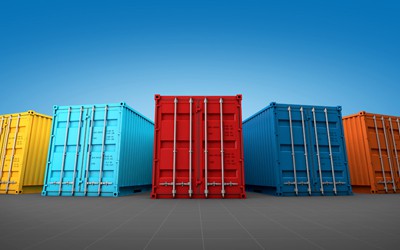

Technical specification of the containers
USE OF CONTAINERS
Storage containers are intended for various uses. Mostly for constructions, industry, for storage or help the transport with various piece materials, building materials, spare parts, or packaged and unpackaged goods. They are very useful with carying products of various sizes and shapes, as well as other raw materials. They can also be used as transport packaging for materials.
The goods can be stored in containers, respectively. transported on pallets, in bundles, or may be in bulk. Containers can also be used for safe storage of machines and technological equipment, such as portable workshops, garages and storage rooms. With their robust and very strong all-steel construction, they are adapted for high loads and constant handling and relocation.
CONSTRUCTION OF CONTAINERS
Supporting frame
The supporting frame of the containers is made of a closed hollow steel-welded cylindrical structure (thickness of steel sheet – 3.0 mm). In all eight corners there are cast steel corner elements with oval holes (sheet thickness of corner elements – 6.0 – 8.0 mm). This is enabling mechanical gripping and easy handling of containers by means of a truck crane (for 40′ foot containers) or a vehicle with hydraulic arm (only for 8′, 10′ and 20′ foot containers).
The handling of the container by means of a forklift truck is also enabled by two pairs of picking holes (tunnels) in the lower part of the supporting frame.The casing
The casing consists from walls, made from profiled steel sheet 1.5 – 2.0 mm thick. The floor consists from a frame made from steel profiles. This floor grate is welded from cylindrical and hollow beams, which is covered with galvanized corrugated steel sheet 4.0 mm thick, on which laid a wooden floor, made of impregnated plywood boards from 22.0 to 25.0 mm thick. Storage containers do not have thermal insulation.
Doors
The front wall of the container consists of a double-leaf door, which is secured with four vertical galvanized rods. Galvanizing the components of the container by spraying, has an anti-corrosion effect. The drawbars have galvanized suspension pins and a locking flap, which allows the suspension of two, respectively four padlocks or security seals to lock the container. However, locks are not included in the delivery of containers.
An important element of the passive safety of containers is also the protective flap / housing covering the locking flap with the lock / seal, which thus prevents undesired corrosion, breakage or damage to the lock / seal of the container. The perimeter of the door is fitted with a rubber seal. Their opening angle is 270 °. The surface treatment of the doors and the shell of the containers consists of one primer and two top coats.
